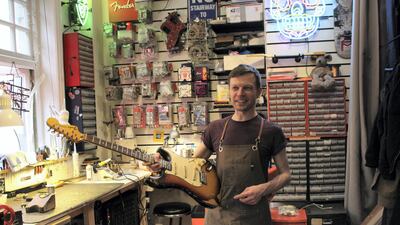When London’s guitar enthusiasts pay a visit to Kevin Bourque for a service, they’re not just running an errand – they’re having an experience. Located up a tight stairwell on the capital’s famous Denmark Street – known as the city’s Tin Pan Alley for its relevance to the music industry – his workshop, aptly named Stairway to Kevin, is a shrine to guitar craftsmanship. One recent Saturday morning, customers filed in and out of his neon-lit studio with a variety of stringed instruments in conditions ranging from brand new to “found in grandpa’s attic”. “I’ve worked on thousands of guitars over the years,” Bourque, 37, says, as he dismantles a 1972 Fender Stratocaster to refit its shoddy internal wiring.
The Canadian, who grew up in Toronto, played in garage bands using discarded drum sets and guitars he learned to fix. The experience allows him to personalise guitar set-ups for his customers, who span working musicians, guitar collectors and first-timers. “Being able to play means you’re closer to actually being able to tell what someone wants – even if they don’t know what they want,” he says.
Bourque is upfront with clients on the cost and time it will take to repair an instrument. Common jobs include removing sticky drink spills from valuable guitars and repairing cracked necks. There is no shortage of demand: requests for full restorations are placed on a three to four-year waiting list. The five ongoing projects hung on his wall include a castoff Flying V from the mid-1980s that’ll take him until the end of this year.
“I put the same quality of work into each one, whether it is a £2,000 (Dh9,425) or £50 guitar. I’ve got a minimum standard that I want to deliver.” In a fully-automated world, his is a throwback, hands-on job that remains irreplaceable. Tricks of the trade include using sawed-off cow bones for various parts of the guitar, and the bone dust to fill in slots when necessary (he buys the bones on eBay). Bourque has repaired vintage guitars worth upwards of £75,000, including a 1930s Martin D-28 and a 1950s Fender Broadcaster. He also finetunes rare instruments, once owned by famous rockers, before they’re sent to auction. Those can fetch up to £1 million, “but that’s a whole other story”.
Bourque is one of five full-time guitar techs on Denmark Street, a small strip of London lined with music stores that has morphed since its heyday as the rockers’ hub of the Swinging Sixties. David Bowie and the Rolling Stones recorded some of their earliest tracks there. Elton John worked his first job at a songwriter’s publishing house up the road.
Yet, because of London’s upcoming Crossrail fast train network that will hover above the street, construction has been rampant. Music venues have shut down and some shops have relocated. Bourque recently moved from one end of the street to the other, and plans to return to his original spot when building work is completed. Despite the upheaval, Denmark Street remains relevant. While Bourque won’t reveal which famous musicians have graced his doors, guitar heroes Jimmy Page, Eddie Van Halen and Joe Bonamassa have recently been spotted shopping on the legendary street.
Bourque has been a fixture on the road for 16 years, working in various repair shops before opening Stairway to Kevin in 2015. He landed there entirely by accident, arriving in London with nothing more than £100 in his pocket and experience he gained apprenticing in Toronto. “I have to admit that I was naive and unaware of Denmark Street or its significance,” he says in an accent that drifts between Canada and Scotland, where he spent time as a broke musician before moving to London.
While he’s found success, it’s not come easy. The margins of the business rely staying open late six days a week. Bourque mitigates the long hours by standing on a foam mat to cushion his feet while working. Another hazard of the trade? Electric shocks. Bourque has been electrocuted so often that he can now gauge the strength of the current running through his body.
Despite the medical perils to his profession, Bourque often uses the same qualities honed by elite heart surgeons: steady hands and the ability to keep his clients’ expectations in check. “There are a few things I don’t like doing,” he says. “Giving people bad news is one of them. Sometimes, it’s a little bit brutal.
“I’ve seen some people get a little bit emotional with stuff,” he says, “especially if it’s a family heirloom. Those are usually the worst.”
It’s not surprising, therefore, that Bourque prefers to be left alone when it’s time to break out the knives. “I don’t mind if people watch me when I’m working, but I won’t let them watch if there’s any sort of chisels or saws,” he says. “I try and take the client’s feelings into account.”

